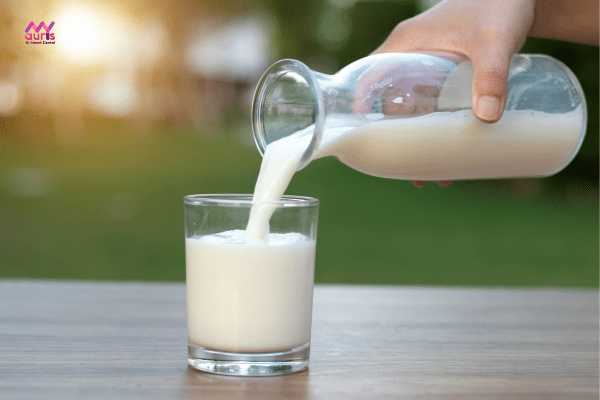The braces process is both time-consuming and quite a long journey. Therefore, to keep the desired results and limit adverse effects on teeth, the doctor will also advise and guide the diet after braces. To understand the foods you should and should not eat after braces, learn with My Auris Dentistry through this article.
Why do you need to pay attention to what you eat and drink when you have braces?
During the braces process, eating scientifically, healthily, and properly plays an important role. Because it not only limits the problems of loosening, slipping of brackets, broken wires, etc. but also ensures nutrition for the body during treatment. Compliance with the diet also contributes to shortening orthodontic time and bringing about the desired results.
At the same time, in the beginning of orthodontics, when you are not familiar with the instrument, you will feel pain, and the instrument can easily damage the cheeks, gums, and soft tissues in the oral cavity. Eating properly will help heal wounds quickly, reduce the frequency of chewing, limit the impact on teeth as well as effectively reduce pain.

Not only that, eating properly helps protect your oral health, limit diseases, and help with braces time and expected results. In addition, eating well helps the body avoid weight loss, sunken cheeks or stomach and digestive problems.
Diet after braces What?
When you first get braces, the appliance will cause discomfort for the person with braces because they are not used to it, so it is difficult to chew, easily cause pain, and rub and damage soft tissue. After removing braces, teeth are still not used to it and are not stable, so you also need to pay attention to eating like when wearing braces. Therefore, in order to ensure adequate nutrition and a full range of nutrients, people need to pay attention to supplementing the following food groups:
Cooked, soft foods – Eating after braces
Food should be cooked in a soft, easy-to-swallow form, with limited chewing such as porridge, soup, Vermicelli, pho, cereals, etc. When cooked well, these foods have a delicious taste, are easy to eat, and do not require much chewing.
Besides, still ensuring adequate essential nutrients for the body, avoiding malnutrition and physical weakness.
Milk and dairy products
This is a food source that is easy to supplement and rich in nutrients. Milk and dairy products such as cakes, cheese, yogurt, soft butter,… all have a variety of nutrients for the body without having to chew much. In particular, simple and convenient foods that can be supplemented at any time especially when you feel pain and don’t want to eat. Moreover, milk is rich in calcium and vitamin D to help strengthen bones and teeth.
However, to protect oral health, you should choose low-sugar or sugar-free milk and dairy products.

Egg dishes
Chicken eggs or egg dishes such as flan, sponge cake,… are rich in nutrients, especially calcium and vitamin D to help strengthen bones and teeth. Furthermore, eggs as well as egg dishes are soft and easy to eat, limiting pain for orthodontists.
Soft vegetables and fruits – Eating after braces
Vegetables and fruits are a food group rich in fiber, vitamins and minerals necessary for the body. In particular, increasing vegetables and fruits helps improve the immune system, thereby protecting the body against infections and inflammation.
If you feel pain and have difficulty chewing, you can use soft fruits and vegetables such as bananas, papaya, mango, watermelon, mashed potatoes, boiled sweet potatoes, grapefruit, dragon fruit,… or can be supplemented in the form of juice or smoothies.

Nutritious cereals
Nutritious cereals such as wheat, barley,… are rich in fiber, antioxidants, vitamins and essential minerals.
Meats and seafood
Meats: fish, pork, beef, chicken, seafood,… are indispensable foods because they provide protein and many other essential nutrients for the body. If the meat fibers are difficult to chew, you can use minced meat, ham, or pork.Cut the meat into small pieces and prepare soft meat, cook it with porridge and soup.
What should not be eaten after braces?
In addition to foods that need to eat after braces, people should also pay attention to foods that need to be avoided to limit damage as well as affect the results of braces:
Hard foods – Eating after braces braces
Hard foods such as hard candy, bones, ice, nuts, ice cubes, hard cookies, etc. require a lot of chewing force from the teeth, so they will cause pain as well as make the brackets and wires easily move, slip or break, affecting the results of braces.

Foods that are flexible and tough
This is a group of foods Foods to stay away from because crushing these foods requires constant and intense chewing. Not only that, but these foods are also sticky, making them difficult to clean, creating conditions for bacteria to multiply, causing dental diseases. Therefore, it is necessary to avoid sticky, flexible foods such as rice cakes, sticky rice cakes, sticky rice, marshmallows, chewing gum, etc. Cold ice cream, ice cubes, cold drinks, etc. can cause tooth sensitivity and pain. Because when orthodontic traction is applied, the teeth affected by the appliance become weak and sensitive, not like before.
Crunchy, crumbly foods
Eating and drinking after braces need to limit crunchy, crumbly foods such as bread, snacks, chips, chips, etc. because food crumbs can stick deep into the braces or gaps that are difficult to clean. Over time, accumulation creates conditions for bacteria to multiply and develop, causing diseases.

Candy, foods high in sugar – Eating and drinking after braces
Confectionery foods, high in sugar and fat, fast food,… contain a lot of starch and sugar, increasing the risk of producing acids that cause tooth decay or other diseases.
Tea, coffee, beer, alcohol, stimulants
When eating and drinking after braces, you need to abstain from these types of foods to ensure oral and physical health.
Hopefully with the information in the article about eating after braces, people can understand the foods that should and should not be eaten during orthodontics. This is not the case Not only is it good for your body’s health, but it also protects your oral health better. Not only that, it also helps shorten orthodontic time. Please contact My Auris dentistry immediately if you still have concerns or concerns about braces or orthodontics.





